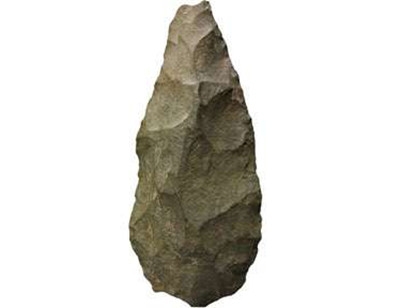Without those extra chips on the edge of the chopping tool, this whole series would be impossible, because those chips tell us that right from the beginning, we - unlike other animals - have wanted to make things more complicated than they need to be. You see, objects carry powerful messages about their makers, and the chopping tool is the beginning of a relationship between humans and the things they create, which is both a love affair and a dependency.
倘若沒有那額外的幾次敲擊,也就不會有這些后話,這些敲敲打打說明人類一開始便與眾不同,總是嘗試著制作出比實際需要更加復雜的東西。你看,物品能強烈地傳達出其制作者的信息,這件切割工具便反映出人和人造物之間的最初關系——既是愛戀,又是依賴。
From this point on, we can't survive without the things we make and, in this sense, it is making things that makes us human. Leakey's discoveries in the warm earth of the Rift Valley did more than push humans back in time, they made it clear that all of us descend from those African ancestors, that every one of us is part of a huge African diaspora - we all have Africa in our DNA and all our culture began in the same place. Wangari Maathai is a Kenyan environmentalist and a Nobel Peace Prize winner:
自這一刻起,我們離了人造物便無法生存。從這個角度講,是制作物品造就了人類。在東非大裂谷溫暖的泥土里,李基(Leakey)的發現不僅推延了人類的歷史,其更深刻的意義在于它表明我們均為非洲祖先流散在各地后裔,我們的DNA中均含有非洲的遺傳密碼,我們的文明一脈相承。王蓋里?瑪太(Wangari Maathai)是一位肯尼亞環保主義者和諾貝爾和平獎得主:
"So far it seems like the information we have tells us that we came from somewhere within this part of the world in eastern Africa. And that of course for many people must be surprising - because I think we are so used to being divided along ethnic lines, along racial lines, and we look all the time for reasons to be different from each other - it must be surprising to some of us to realise that what differentiates us is usually very superficial, like the colour of your skin or the colour of your eyes or the texture of your hair, but essentially that we are all from the same stem, the same origin. So, I think that as we continue to understand ourselves and to appreciate each other, and especially when we get to understand, for example, that we all come from the same origin - we will shed a lot of the prejudices that we have harboured in the past."
“我們當前所掌握的信息顯示我們均源自于這里——東非的某個區域。這個結論聽上去匪夷所思,因為我們早已習慣于各種各樣的民族劃分和種族劃分,而且我們追求與眾不同,所以當人們意識到我們的區別通常只是膚色、眼珠色和發質這些膚淺的因素時,一定覺得非常不可思議。事實上,我們本是同根生。我想,當我們不斷嘗試了解自己、欣賞他人,特別是認識到我們同根同源時,那些冥頑不化的偏見便會蕩然無存。”
Listening to the news on the radio, it's easy to imagine the world is divided into rival tribes and competing civilisations. So it's good, it's essential in fact, to be reminded that the idea of our common humanity is not just an enlightenment dream, but a genetic and a cultural reality. It's something we'll see again and again in this series.
聽著收音機播報的新聞,我們不難想象世界被分割為彼此敵對的部落和相互競爭的文明。因此,我們記起普遍人性的理念不止是一個啟蒙的夢想,更是基因和文化的事實,這是非常重要的。這一點將在一系列節目中得到反復驗證。
Our next object is the tool that people took with them when they first left Africa and began to spread around the world - it's been called the Swiss Army knife of the Stone Age ... it's the hand axe.
我們下期介紹的是人類首次離開非洲、流向世界時所攜帶的工具,它有“石器時代的瑞士軍刀”的美譽——手斧。












